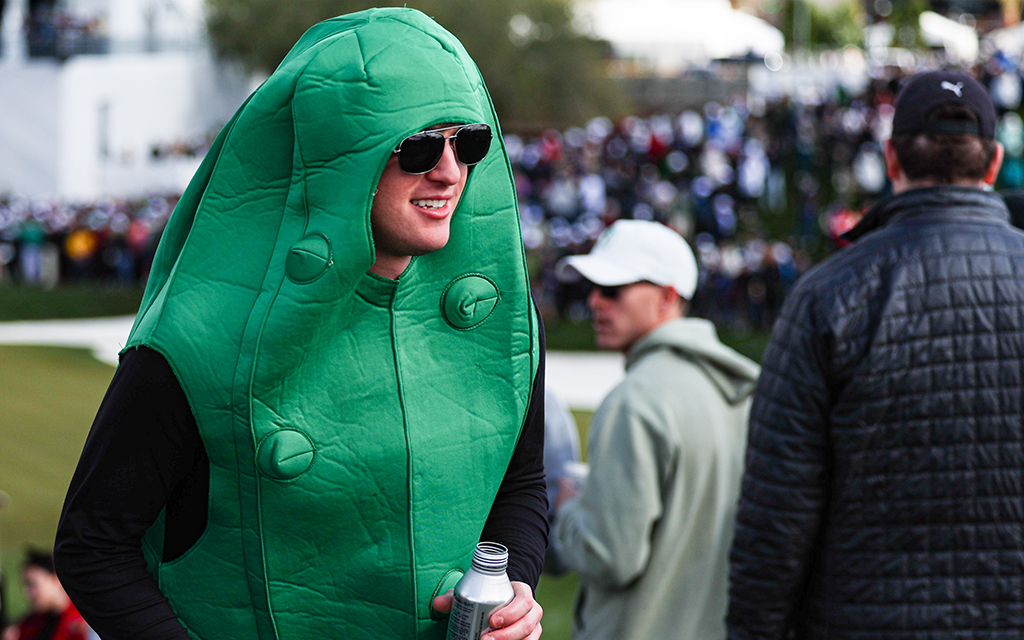SCOTTSDALE – In golf, the easiest path to the pin is usually aiming for the green. On Saturday at the WM Phoenix Open, the easiest way to support local sustainability causes was simply wearing green.
Saturday’s action started with the continuation of the second round, while third round tee times began mid-afternoon. Large crowds contributed to some congestion problems but it also meant a win for sustainability. One dollar was donated to the Working For Tomorrow Fund for each fan that entered wearing any variety of green apparel.
“Green represents both the money that goes to charity and the green for what we do here at this zero waste event,” said Jannette Micelli, Waste Management’s director of communications. “The fans have a lot of fun with it, they get decked out.”
Waste Management is now in its 15th year as title sponsor of “The People’s Open” and has worked annually on the Saturday green out event creating a tradition that every “fan, attendee, player, you name it” can participate in, said Micelli, who was wearing green from head to toe.
“I’ve been a WM ambassador since ‘07, so for a long time now,” said Charley Hoffman who stood tied for sixth after play ended on Saturday. “I want to embrace the green glove forever, and obviously recycling is keeping our Earth beautiful.”
By now, those who frequent the tournament each year most likely have plenty of green selections to choose from, and newcomers didn’t need to look far to fit in because a quick google search could get them to Golf Digest’s last minute style guide for the Phoenix Open.
In partnership with The Thunderbirds, this fund will directly support greenhouse gas emissions reduction, sustainable materials management and water management initiatives throughout the state of Arizona.

A fan dressed in a cactus costume provides a local take on the green out at the WM Phoenix Open Saturday. (Photoi by Ethan Briggs/Cronkite News)
According to the tournament’s 2022 sustainability report, 4,060 pounds of unused food was donated to local non-profits, 90,000 square feet of signage was reused and 5.6 tons of building materials were donated to local organizations.
The fund beneficiaries include organizations like DigDeep’s Navajo Water project, the Colorado River Indian Tribes Drip Irrigation Conversion Project, the Gila River Indian Community Irrigation Canal PV project and Waste Not’s mission to reduce food waste.
“The amount of food we are able to rescue from this event enables us to feed thousands of hungry people in the Valley, while also ensuring that absolutely no food makes it to the landfill,” said Hillary Bryant, executive director of Waste Not.
The food will be delivered to organizatioon across the Valley including St. Vincent de Paul and Native American Connections.
Water management is a priority, too.
“This is aimed at making sure farmers and other individuals and tribes have the technology to make sure they’re using the right amount of water,” Micelli said. “That’s why we call it ‘water restoration’ versus ‘conservation.’”
Micelli said that historically the fund has been able to raise around $170,000 and he expects a similar amount for 2024. While impactful, Saturday’s green out only accounts for a portion of the money donated. Sponsor, vendor and fan donations all play a vital role in the event’s overarching goals.
Certain initiatives like the lack of trash cans on the course and the use of recycling and compost bins instead are easy to notice by the average visitor, Micelli said, but that there are many other aspects of the competition that contribute to the objective.
After the last scores are tallied on the course, materials can be used again at other events, signage can be stored away for the following year, and “hard to recover”materials go through a waste to energy process.
“It’s much bigger than a one week event,” Micelli said. “From the time they start constructing all of the infrastructure and facilities in September until the last materials are removed in April, it’s zero waste.”


